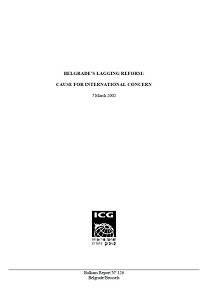BELGRADE’S LAGGING REFORM: Cause for international Concern (ICG Balkans Report N° 126)
BELGRADE’S LAGGING REFORM: Cause for international Concern (ICG Balkans Report N° 126)
Author(s): Author Not Specified
Subject(s): Civil Society, Governance, Government/Political systems
Published by: ICG International Crisis Group
Summary/Abstract: For more than a decade Serbia was the driving force behind much of the instability in the Balkans. Following the overthrow of Slobodan Milosevic on 5 October 2000, it was hoped that Serbia would promptly reform the external policies of the Federal Republic of Yugoslavia (FRY) that had caused such disruption. To date, these hopes have been substantially disappointed. Nevertheless, the FRY has set its sights on catching up with its neighbours by integrating into Euro-Atlantic institutions and political processes. In particular, it wants to make significant progress during 2002 towards three major foreign policy goals: accession to the Council of Europe (CoE); membership in NATO’s Partnership for Peace (PfP); and negotiating a Stabilisation and Association Agreement (SAA) with the European Union (EU).
Series: ICG Balkans Report
- Page Count: 38
- Publication Year: 2002
- Language: English
- Content File-PDF
- Introduction

